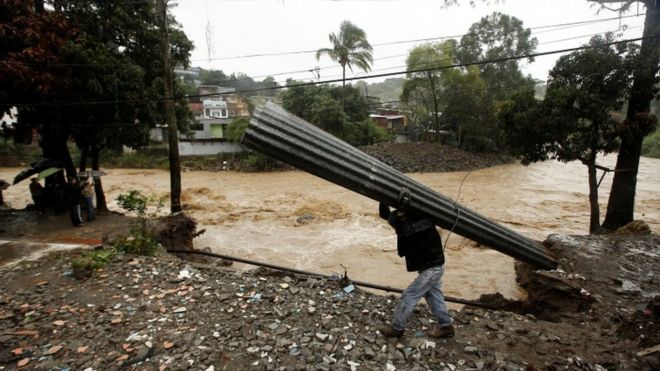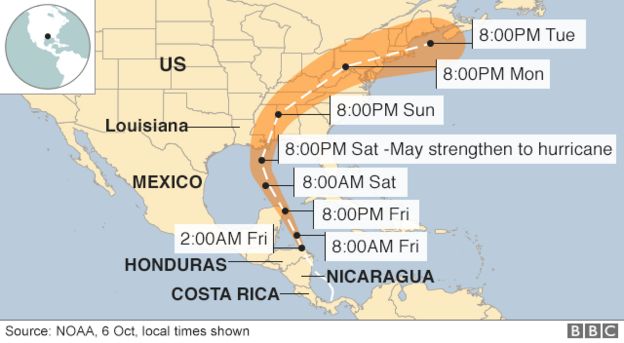
Tropical Storm Nate has killed at
least 22 people in Costa Rica, Nicaragua and Honduras as it heads north
towards Mexico and the US.
A state of emergency has been declared in the Central American nations, where more than 20 people are missing. It has caused heavy rains, landslides and floods which are blocking roads, destroying bridges and damaging houses.
In Costa Rica, nearly 400,000 people are without running water and thousands are sleeping in shelters.
At least eight people have died in the storm there, while another 11 were killed when it moved north and reached Nicaragua, where as much as 15ins (38cm) of rain had been predicted to fall by the US's National Hurricane Center.
Three people have been killed in Honduras, including two youths who drowned in a river, and several are reported missing.
One man was also reportedly killed in a mudslide in El Salvador, according to emergency services.

In Costa Rica, a group of people were trapped on a stretch of the Inter-American Highway known as the Mountain of Death after the bus they were travelling in got stuck between two landslides on Wednesday evening, according to La Nación newspaper.
The newspaper said one of the passengers, Graciela Chinchilla Fuentes, has been communicating via mobile phone. She said she is worried she will run out of supplies for her three-month son before they are rescued.
There are also concerns crocodiles may be lurking around the overflowing Tárcoles river, and could appear in places where they are not normally expected.
"Please do not kill crocodiles," said officials, according to news site CRHoy.com. The advice was to avoid standing in overflowing water, to protect children and pets, and to call the emergency services if one was spotted.
However, authorities have also warned citizens to be wary of fake news, as one picture of a giant crocodile being lassoed in the street, which was circulating online, had in fact been taken in Mexico.
All train journeys were suspended in Costa Rica and dozens of flights cancelled on Thursday.
More than a dozen national parks popular with tourists have been closed as a precaution.
The storm also caused extensive damage to infrastructure in Nicaragua.
The country's Vice-President Rosario Murillo advised people to be cautious in the heavy rains.
"Sometimes we think we think we can cross a river and the hardest thing to understand is that we must wait," he said on state radio.
"It's better to be late than not to get there at all."
Nate was expected to move off the eastern coast of Honduras at 23:00 ET (03:00 GMT) on Thursday, according to the National Hurricane Center.
Forecasters say the storm will gain strength and become a category one hurricane before it makes landfall on the southern coast of the United States on Sunday.
- How to stay safe in a hurricane
- Do 'Pray for...' messages make disaster relief harder?
Both Texas and Florida are still recovering from the damage inflicted by Hurricane Harvey, which hit the former in August and caused "unprecedented damage", and Hurricane Irma, which made landfall in Florida in September.
A state of emergency was declared in 29 Florida counties, and in New Orleans in Louisiana.
The mayor of the city told people who live on low-lying ground to evacuate.
"There is no need to panic," Mitch Landrieu tweeted. "Be ready and prepare. Get a plan. Prepare to protect your personal property."
Oil companies operating in the Gulf of Mexico says they are evacuating staff from platforms which lie along the predicted path of the storm.
Originally published on http://www.bbc.com/news/world-latin-america-41520672

No comments:
Post a Comment